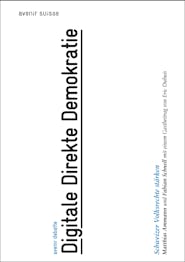In most western nations, digitization faces strong headwinds. Technology has been held partly to blame for Trump’s election, Brexit and rising populism. Switzerland has focused particularly on the tools for direct democracy, as these so determine the country’s political system. Largely overlooked until now, however, is how much digital processes are already at work, making the relevant question not whether digitization should have a role in the democratic system, but, rather, when and how?
The temporary ban on e-voting at federal level highlights the importance of sober analysis. Fabian Schnell and Matthias Ammann offer that in Avenir Suisse’s latest study, “Digital Direct Democracy.”
The authors focus on the digitization of the three central pillars of decision making in direct democ-racies.
E-Collecting: electronic gathering of signatures for initiatives and referendums
Electronic Identity (E-ID) is the foundation of digitization and should accordingly become part of everyday life. Its introduction would facilitate collecting signatures for Switzerland’s frequent initia-tives and referendums. But there should also be changes to the thresholds required: Avenir Suisse sug-gests tripling the quorum for signatures gathered by e-collecting to about 6 percent of registered vot-ers.
E-Discussion: opinion forming in a digital age
Digitization can broaden the public debate and should be used politically as a way of exchanging opinions. While the internet eases the spread of fake news and exploitation of popular emotions, Swiss citizens have always acted responsibly. Contrary to many fears, direct democracy has remained re-sistant to manipulation. Swiss politics should prepare for the challenges of new channels of communi-cation. But additional regulations should be avoided in what is a dynamic area which should remain free of legal interference.
E-Voting: Voting and elections via Internet
The development of e-voting has been in the cross hairs of critics – meaning the advantages have gone virtually unnoticed. Simplifying voting for Swiss citizens living abroad, or for locals with disabilities, are just two benefits. So are avoiding invalid ballot papers and verifying one’s own vote. Moreover, when it comes to security, traditional ways of voting seem almost antiquated now. Further develop-ment of e-voting would allow electors to express their preferences more coherently. Developing e-voting and refining it further are essential for direct democracy, irrespective of any current temporary freezes.
Switzerland’s political processes need no radical overhauls in the digital world. But the country should seize the chance to harness modern technology to bring direct democracy even closer to the people. Since 1848, Switzerland’s political structures have been constantly adjusted to social and technological developments. There is no need to fear such changes.






